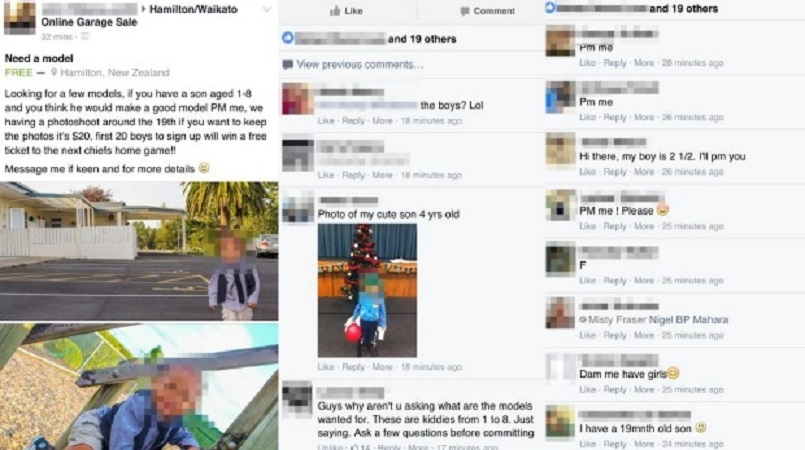
Parents who post pictures of their children on social media are putting them at risk, a detective heading the crusade against online child abuse says.
Detective Senior Sergeant John Michael likens sharing pictures online to putting a child's polaroid on a lamp post
Many parents and family members are unaware of the dangers that can pose.
In one case, parents offered up pictures of their kids on a Facebook buy and sell page in Hamilton after a person advertised for male models aged between one and eight.
In another case, pictures of two Hamilton boys were stolen and used on a social media account by a person parading as their mother.
It doesn't matter if you post a photo that you think only your friends can see," Michael said. "You've actually lost all control over that image and you then should have no expectations after doing that, of any privacy in relation to that image."
Ilietaa Love said she only shares photos of her sons, aged one and two, with her friends and family on Facebook.
But photos of Love's children were taken from her brother's social media account. Her brother posted pictures of the children on a whim to wish them happy birthday.
"I got a call from my little sister saying, 'hey, there's a chick using pics of the boys on Facebook, who is she?'", Love said.
"She posted the pictures on her page, acting like they were her kids. I felt physically ill, I didn't even know who she was."
Love asked the woman to take the pictures down, but the woman blocked Love from her Facebook page. She said she does not know where the woman lives or her real name, which is the scary part.
"That's when I started to panic, so I asked my family members to ask her to take them down and the same thing happened. They got blocked too," she said.
"I was annoyed at my brother because he knows not to post pictures without asking me. I thought I was being careful online but it just goes to show anything can happen.
"My biggest fear is that she'll turn up to my sons' daycare and take them. She knows what they look like."
Michael said posting pictures to your family and friends offers a false sense of security.
There are at least 800,000 people in New Zealand connected to social media who upload images.
"You can put messages out there and people will continue to post pictures of their children, because for them, it's potentially an acceptable risk."
He said most of the images his team deal with come from South America and South East Asia.
"In the past we've had cases where we've had New Zealand victims and their images have been posted online and we've gone to those sites and had the images taken down," he said.
"But by then, it's like closing the stable after the horse has bolted. Because those images are out there and we're effectively doing damage control."
On a Facebook buy and sell page in Hamilton, a person posted an advertisement asking whether boys between the ages of one and eight would be available for modelling jobs.
Within minutes, parents were sending the poster images of their young boys, some posting them publicly, along with details that described their childrens' suitability for the job.
"You've got to be a little bit dubious about these posts and you've got to question them and think, well should I respond to that? Should I send a photo of my child to this person? To me it seems a no-brainer," Michael said.
"There's generally no way of proving whether the information they provide is true or not.
"There's a phrase, 'trust no-one', and that's the phrase when you're on the internet."
Michael believes schools generally do a good job of educating students about cyber safety.
"We stress it all the time, once you post that image, don't think you have any control over it. Because you've lost control the moment you've posted it."
